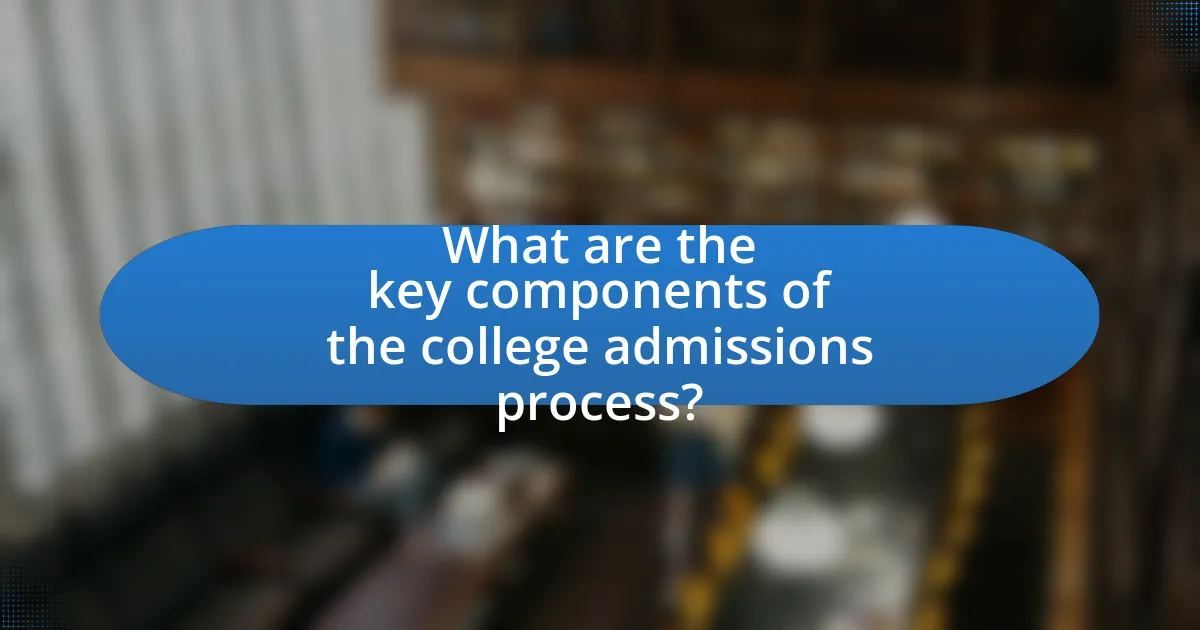The article focuses on the college admissions process, providing essential insights for high school seniors preparing to apply. It outlines key components such as application submission, standardized testing, letters of recommendation, personal essays, and interviews, all of which influence admission decisions. The article emphasizes the importance of academic performance, extracurricular activities, and effective preparation strategies for standardized tests. Additionally, it discusses how to choose the right colleges, the significance of college rankings, and best practices for submitting applications, ensuring that students are well-equipped to navigate the complexities of college admissions.

What are the key components of the college admissions process?
The key components of the college admissions process include application submission, standardized testing, letters of recommendation, personal essays, and interviews. Application submission involves completing forms and providing academic records, while standardized testing typically requires scores from exams like the SAT or ACT. Letters of recommendation are written by teachers or counselors to support the applicant’s candidacy. Personal essays allow students to express their individuality and motivations, and interviews may be conducted to assess fit and interest in the institution. These components collectively influence admission decisions, as they provide a comprehensive view of the applicant’s qualifications and character.
How do high school seniors prepare for college admissions?
High school seniors prepare for college admissions by focusing on academic performance, standardized test preparation, and building a strong application portfolio. They typically maintain or improve their GPA, engage in extracurricular activities, and seek leadership roles to enhance their profiles. Additionally, many seniors take standardized tests like the SAT or ACT, often participating in preparatory courses or practice exams to achieve competitive scores.
To strengthen their applications, seniors gather recommendation letters from teachers or mentors, write personal statements or essays that reflect their experiences and aspirations, and compile a list of colleges that align with their goals. According to the National Association for College Admission Counseling, 85% of colleges consider high school GPA as the most important factor in admissions decisions, highlighting the significance of academic performance in the preparation process.
What academic qualifications are required for college admissions?
Most colleges require a high school diploma or equivalent for admissions. Additionally, many institutions consider standardized test scores, such as the SAT or ACT, along with a strong GPA, typically above 2.5 on a 4.0 scale. Some colleges may also require specific coursework, such as advanced placement classes or foreign language studies, to demonstrate readiness for college-level work. According to the National Center for Education Statistics, 94% of first-time college students in the U.S. graduated from high school, highlighting the importance of a high school diploma in the admissions process.
How important are extracurricular activities in the admissions process?
Extracurricular activities are highly important in the admissions process, as they provide insight into a student’s interests, skills, and character. Colleges often seek well-rounded individuals who demonstrate leadership, commitment, and the ability to balance academics with other pursuits. According to a survey by the National Association for College Admission Counseling, 70% of colleges consider extracurricular involvement as a significant factor in their admissions decisions. This indicates that participation in clubs, sports, and community service can enhance an applicant’s profile and improve their chances of acceptance.
What role do standardized tests play in college admissions?
Standardized tests play a significant role in college admissions by providing a uniform measure of academic readiness for applicants. Colleges and universities often use scores from tests like the SAT or ACT to evaluate students’ potential for success in higher education, as these scores can complement high school GPA and other application materials. Research indicates that standardized test scores can correlate with college performance; for instance, a study by the College Board found that SAT scores are predictive of first-year college GPA. Additionally, standardized tests can help institutions compare applicants from diverse educational backgrounds, ensuring a more equitable assessment process.
What are the most common standardized tests required by colleges?
The most common standardized tests required by colleges are the SAT and ACT. These tests assess students’ readiness for college-level work and are widely accepted by institutions across the United States. The SAT, developed by the College Board, includes sections on reading, writing, and math, while the ACT covers English, math, reading, and science reasoning. According to the College Board, over 2.2 million students took the SAT in 2021, and the ACT reported approximately 1.3 million test-takers in the same year, highlighting their prevalence in college admissions processes.
How can students effectively prepare for these tests?
Students can effectively prepare for college admission tests by creating a structured study plan that includes regular practice, review of test formats, and utilization of available resources. A structured study plan helps students allocate specific times for studying different subjects, ensuring comprehensive coverage of the material. Regular practice with sample questions and full-length practice tests familiarizes students with the test format and timing, which is crucial for performance. Additionally, utilizing resources such as prep books, online courses, and tutoring can provide targeted assistance and strategies tailored to individual needs. Research indicates that students who engage in consistent practice and utilize diverse study materials tend to achieve higher scores, as evidenced by a study from the College Board showing that students who prepare effectively can increase their scores by an average of 100 points.
What factors influence college admissions decisions?
College admissions decisions are influenced by several key factors, including academic performance, standardized test scores, extracurricular activities, personal essays, and letters of recommendation. Academic performance, typically measured by GPA, is crucial as it reflects a student’s ability to succeed in a rigorous academic environment. Standardized test scores, such as the SAT or ACT, provide a common metric for evaluating students across different educational backgrounds.
Extracurricular activities demonstrate a student’s interests and commitment outside of academics, showcasing leadership, teamwork, and time management skills. Personal essays allow applicants to express their individuality and motivations, giving admissions committees insight into their character and aspirations. Lastly, letters of recommendation from teachers or mentors can provide a third-party perspective on a student’s abilities and potential.
These factors collectively help colleges assess not only a student’s academic readiness but also their fit within the institution’s culture and values.
How do personal statements and essays impact admissions outcomes?
Personal statements and essays significantly influence admissions outcomes by providing insight into an applicant’s personality, experiences, and motivations. These written components allow admissions committees to assess qualities that standardized test scores and grades may not fully capture, such as resilience, creativity, and personal growth. Research indicates that 70% of admissions officers consider personal statements as a critical factor in their decision-making process, highlighting their importance in differentiating candidates. Furthermore, compelling narratives can enhance an applicant’s overall profile, making them more memorable and appealing to admissions committees.
What is the significance of recommendation letters?
Recommendation letters are significant because they provide a personalized assessment of a student’s abilities, character, and potential from a credible source. These letters often highlight specific achievements and qualities that may not be evident in a student’s application, such as leadership skills, work ethic, and interpersonal abilities. Research indicates that admissions committees value these insights, as they can influence decision-making; for instance, a study by the National Association for College Admission Counseling found that 56% of colleges consider recommendation letters as a very important factor in their admissions process. Thus, strong recommendation letters can enhance a student’s application and improve their chances of acceptance into competitive programs.

How can high school seniors choose the right colleges?
High school seniors can choose the right colleges by assessing their academic interests, career goals, and personal preferences. They should start by identifying their desired major or field of study, as this can significantly narrow down options. Additionally, evaluating factors such as campus culture, location, size, and available resources is crucial. Researching colleges through visits, virtual tours, and speaking with current students can provide valuable insights. According to a survey by the National Association for College Admission Counseling, 83% of students consider the college’s academic reputation as a key factor in their decision-making process. This data underscores the importance of aligning personal values and academic aspirations with the characteristics of potential colleges.
What criteria should students consider when selecting colleges?
Students should consider academic programs, location, cost, campus culture, and support services when selecting colleges. Academic programs are crucial as they determine the quality and relevance of education; for instance, a college known for strong engineering or business programs may better serve students in those fields. Location impacts lifestyle and opportunities, with urban colleges often providing more internships and networking options. Cost is a significant factor, as tuition and living expenses can vary widely; students should evaluate financial aid packages and potential debt. Campus culture influences student experience, including diversity, extracurricular activities, and social life, which can affect overall satisfaction. Lastly, support services such as academic advising, mental health resources, and career counseling are essential for student success and well-being.
How do location and campus culture affect college choice?
Location and campus culture significantly influence college choice by shaping students’ experiences and opportunities. Students often prefer colleges in locations that align with their lifestyle preferences, such as urban versus rural settings, which can affect access to internships, social activities, and job markets. For instance, a study by the National Center for Education Statistics found that 60% of students consider proximity to home as a key factor in their college decision. Additionally, campus culture, which encompasses the social environment, values, and traditions of a college, plays a crucial role in student satisfaction and retention. Research from the Higher Education Research Institute indicates that students who feel a strong sense of belonging and alignment with campus culture are more likely to thrive academically and socially. Thus, both location and campus culture are critical determinants in the college selection process.
What is the importance of college rankings and reputation?
College rankings and reputation are crucial as they significantly influence students’ choices and perceptions regarding higher education institutions. High rankings often correlate with better resources, faculty quality, and job placement rates, making them a key factor in attracting prospective students. For instance, a study by the National Bureau of Economic Research found that students are more likely to apply to and enroll in colleges with higher rankings, which can lead to better career opportunities post-graduation. Additionally, a college’s reputation can affect alumni networks and employer perceptions, further enhancing the value of a degree from a well-regarded institution.
How can students research potential colleges effectively?
Students can research potential colleges effectively by utilizing a combination of online resources, campus visits, and networking with current students and alumni. Online resources such as college websites, rankings from sources like U.S. News & World Report, and platforms like College Board provide comprehensive information on programs, admission requirements, and campus life. Campus visits allow students to experience the environment firsthand, which is crucial for assessing fit. Networking with current students and alumni can provide insider perspectives on the college experience, helping students make informed decisions. According to a survey by the National Association for College Admission Counseling, 83% of students found campus visits to be a significant factor in their college choice, highlighting the importance of direct engagement in the research process.
What resources are available for college research?
College research resources include academic databases, library catalogs, college websites, and educational platforms. Academic databases such as JSTOR and Google Scholar provide access to peer-reviewed articles and research papers, essential for understanding academic standards and expectations. Library catalogs allow students to locate books and other materials relevant to their fields of interest. College websites offer detailed information about programs, admission requirements, and campus life, while educational platforms like Coursera and Khan Academy provide courses and resources that can enhance knowledge about specific colleges and their offerings. These resources collectively support informed decision-making during the college admissions process.
How can campus visits enhance the college selection process?
Campus visits enhance the college selection process by providing prospective students with firsthand experience of the campus environment, culture, and facilities. During these visits, students can interact with current students and faculty, which helps them gauge the academic atmosphere and social dynamics of the institution. Research indicates that 70% of students who visit a college campus report feeling more confident in their choice after the visit, as they can assess whether the college aligns with their personal and academic needs. Additionally, campus visits allow students to explore resources such as libraries, laboratories, and recreational facilities, further informing their decision-making process.

What strategies can high school seniors use to strengthen their applications?
High school seniors can strengthen their applications by focusing on academic performance, extracurricular involvement, and personal statements. Maintaining a strong GPA and taking challenging courses demonstrates academic rigor, which is a key factor in admissions decisions. Participation in extracurricular activities, such as clubs, sports, or volunteer work, showcases leadership skills and personal interests, making applicants more well-rounded. Additionally, crafting a compelling personal statement that reflects individual experiences and aspirations can significantly enhance an application, as admissions committees often look for authenticity and personal growth. These strategies are supported by data indicating that holistic review processes in college admissions increasingly value diverse experiences and strong academic records.
How can students craft compelling personal statements?
Students can craft compelling personal statements by clearly articulating their unique experiences, motivations, and aspirations. This involves reflecting on personal stories that highlight resilience, growth, and passion, which can resonate with admissions committees. For instance, a study by the National Association for College Admission Counseling found that personal statements significantly influence admissions decisions, with 75% of colleges considering them important in evaluating applicants. By focusing on authenticity and specific examples, students can create narratives that stand out and effectively convey their individuality and potential contributions to the college community.
What common mistakes should be avoided in personal essays?
Common mistakes to avoid in personal essays include lack of focus, excessive generalization, and failure to show personal growth. A personal essay should have a clear central theme that guides the narrative; without this focus, the essay can become disjointed and confusing. Additionally, using vague statements instead of specific examples can weaken the impact of the essay, as admissions officers look for unique insights into the applicant’s experiences. Lastly, neglecting to reflect on personal growth or lessons learned can result in an essay that fails to convey the applicant’s development, which is crucial in the college admissions process.
How can students showcase their unique experiences and perspectives?
Students can showcase their unique experiences and perspectives through personal statements and essays in college applications. These written components allow students to articulate their individual journeys, challenges, and insights, highlighting what sets them apart from other applicants. For instance, a student who has overcome significant obstacles, such as a family crisis or a learning disability, can share how these experiences shaped their character and aspirations. Additionally, participating in extracurricular activities, community service, or unique projects can provide concrete examples of their interests and values, further enriching their narrative. According to a survey by the National Association for College Admission Counseling, 86% of colleges consider personal essays as a significant factor in admissions decisions, underscoring the importance of effectively communicating one’s unique story.
What are effective ways to secure strong recommendation letters?
To secure strong recommendation letters, students should build meaningful relationships with their recommenders. Engaging with teachers or mentors throughout the academic year allows them to understand the student’s strengths, achievements, and character. Providing recommenders with specific examples of accomplishments and future goals can enhance the quality of the letter. Additionally, requesting letters well in advance of deadlines gives recommenders ample time to craft thoughtful responses. Research indicates that personalized letters, which reflect a deep understanding of the student, significantly improve the impact of recommendations on college admissions decisions.
How should students approach teachers and mentors for recommendations?
Students should approach teachers and mentors for recommendations by initiating the conversation respectfully and well in advance of deadlines. This involves scheduling a meeting or sending a thoughtful email to discuss their request, highlighting specific achievements and goals that the recommendation should address. Providing context about the intended use of the recommendation, such as college applications or scholarship opportunities, helps the teacher or mentor tailor their response effectively. Research indicates that personalized requests, where students express genuine appreciation for the mentor’s influence, significantly increase the likelihood of receiving a strong recommendation.
What information should be provided to recommenders?
Recommenders should be provided with specific information about the applicant’s achievements, goals, and the context of the recommendation. This includes details such as the applicant’s academic performance, extracurricular activities, personal qualities, and specific experiences that highlight their strengths. Additionally, sharing the purpose of the recommendation, such as the type of program or institution the applicant is applying to, helps recommenders tailor their letters effectively. Providing a resume or a list of accomplishments can also assist recommenders in crafting a comprehensive and personalized recommendation.
What are the best practices for submitting college applications?
The best practices for submitting college applications include starting early, carefully reviewing application requirements, and ensuring all materials are submitted by deadlines. Early preparation allows students to gather necessary documents, such as transcripts and recommendation letters, and to craft thoughtful essays. Reviewing requirements ensures that applicants meet specific criteria for each college, which can vary significantly. Meeting deadlines is crucial, as late submissions can disqualify an application. According to the National Association for College Admission Counseling, timely submission of applications is linked to higher acceptance rates, emphasizing the importance of adhering to deadlines.
How can students ensure they meet application deadlines?
Students can ensure they meet application deadlines by creating a detailed timeline that includes all relevant dates and tasks. This timeline should outline when to start each application, gather necessary documents, and submit materials, allowing students to manage their time effectively. Research indicates that students who use organizational tools, such as calendars or project management apps, are 30% more likely to submit their applications on time compared to those who do not. Additionally, setting reminders for each deadline can help maintain focus and accountability throughout the application process.
What should be included in a complete college application package?
A complete college application package should include the following components: an application form, personal statement or essay, letters of recommendation, high school transcripts, standardized test scores (if required), and a resume or list of extracurricular activities.
The application form provides essential personal information and academic history. The personal statement or essay allows applicants to express their individuality and motivations. Letters of recommendation from teachers or mentors offer insights into the applicant’s character and abilities. High school transcripts provide a record of academic performance, while standardized test scores, such as the SAT or ACT, may be required by some institutions. Lastly, a resume or list of extracurricular activities highlights involvement outside of academics, showcasing leadership and commitment.
These components collectively present a comprehensive view of the applicant, which colleges use to evaluate suitability for admission.


